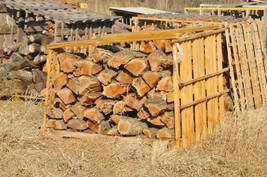
The highest value for trees commonly found in Kansas is Osage orange (hedgeball tree) at 4,800 pounds per cord. Osage orange has a gnarly growth habit and a nasty set of thorns. This species also sparks which isn’t a problem in a wood-fired boiler but certainly would be in an open fireplace.
Black locust is next with 4,200 pounds per cord. Black locust is a fast grower and also has excellent burning qualities and makes a nice bed of coals. However, it is hard to split, suckers, and has some relatively small thorns, especially on young trees.
Bur oak and red oak come in at 3,800 and 3,500 pounds per cord respectively but are not fast growers. Mulberry, however, has the same weight as red oak but grows more quickly. Silver maple has less heat value (3,000 pounds per cord) but is a very fast growing tree.
Black locust appears to be the best choice for this purpose though you need to be very careful with this species due to its suckering habit as it can be invasive. Killing out a planting is an expensive and time-consuming process. Also black locust is poisonous to certain livestock.
Mulberry would also be a good choice and does not have the drawbacks that black locust does.
Each situation is different and another species may work better for you. Or, you may wish to plant rows of several species. So how do you set out your plantation? Dr. Wayne Geyer, our late forestry professor, did many woody biomass studies over a period of 35 years. Following are some recommendations that have come out of his studies.
- Plant locust a few rows in from a field edge to reduce suckering in the field.
- Plant on a close spacing, 4 to 6 feet apart. This maximizes yield and reduces side branching.
- Control weeds the first two years.
- Harvest every 5 years, most trees will resprout and can be reharvested.
- Plant about 1 acre per year for 5 years if you wish to supply the majority of the firewood needed to heat your home.
Trees mentioned above and available from the Kansas Forest Service include osage orange, bur oak, red oak and silver maple. (Ward Upham)
 RSS Feed
RSS Feed
